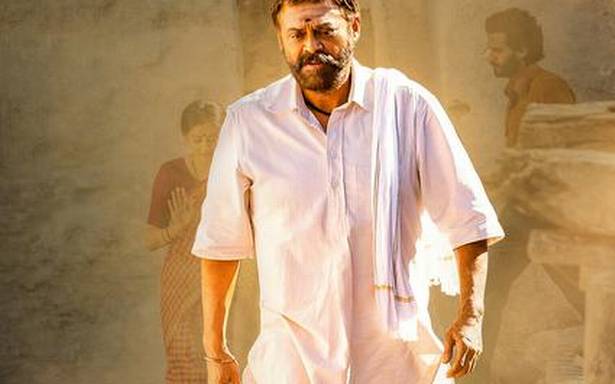Venkatesh, Priyamani and Karthik Rathnam show their mettle in the Telugu film ‘Narappa’ that stays unwaveringly faithful to the source material
To talk about the most obvious aspects of Narappa, now streaming on Amazon Prime Video, it’s a faithful and nearly a frame-to-frame remake of the Tamil film Asuran (2019). With its story inspired by Poomani’s Tamil novel Vekkai (heat), Asuran was adapted to the screen by director Vetri Maaran, and influenced by the Kilvenmani massacre in Tamil Nadu in the late 1960s.
Director Sreekanth Addala and actor Venkatesh Daggubati take up the poignant and personal story of the protagonist’s fight for dignity and keep it as close as possible to the original material. If you’ve watched Asuran, you can recall each scene, down to the dialogues and even the similar placement and movement of the actors on screen. Narappa works better if you haven’t watched Asuran (also streaming on the same platform) or can look past these similarities. Narappa
- Cast: Venkatesh Daggubati, Priyamani, Karthik Rathnam, Rajeev Kanakala
- Direction: Sreekanth Addala
- Music: Mani Sharma
- Streaming on: Amazon Prime Video
The story can ring true in the context of caste and class conflicts in any part of India. A flashback in Narappa harks back to a time when the lower caste wearing footwear was frowned upon and triggered humiliating punishments. Times might have changed in Ramasagaram village in Anantapur; Narappa (Venkatesh) can now buy a pair of new footwear for his son without thinking twice, but the caste and social divide continues. The upper class has now put up an electric fence and eyes a three-acre land owned by Narappa’s family.
In a broad sense, Narappa is a story of revenge and the leading man’s transformation is reminiscent of Rajinikanth in Baasha. It’s the quintessential masala film template with a rousing pre-intermission clash, but Narappa revels in its rustic and raw setting. The terrain adds a lot of charm to the narrative. The vast forest, cliffs and arid land play a crucial role in the chase and escape.
The template of the fight between the privileged and the non-privileged might be familiar, but the little comments and observations peppered throughout the film keep us invested.
The older son Munikanna (Karthik Rathnam in a rooted and effective portrayal) comments that it takes time to build and a fraction of it to pull down something; Sundaramma (Priyamani is effortlessly fiery, and in some places reminded me of her earlier Tamil film Paruthiveeran) stating that she would have been happy if an act of violence had been done by the two grown-up men of the house and not her younger son; Narappa stating matter-of-factly that the brother in law (Rajeev Kanakala) has been spared for a reason, and much later emphasising that education is the only thing that cannot be snatched away in their fight for survival.
In a telling scene, the adolescent son is inconsolable after the demise of the family’s pet dog that gets caught in the electric fence. Narappa remarks that he’s relieved the loss stopped with the pet dog and not the family members.
The performances work to Narappa’s favour. Venkatesh is credible as the meek middle-aged man keen to save his family, Rao Ramesh is in sync as a lawyer advocating social change, and there’s Nasser, dependable as usual. Ammu Abhirami and Aadukalam Naren reprise their parts from the original, both managing to evoke the same emotions as before.
If one were to look closely at the difference between Asuran and Narappa, it would have to do with the minute differences in Ammu Abirami’s characterisation. She’s lovely and moving, and Jhansi pitches in for a brief role as her mother.
The songs by Mani Sharma complement the narrative without overpowering the proceedings.
(Narappa streams on Amazon Prime Video)
Source: Read Full Article

